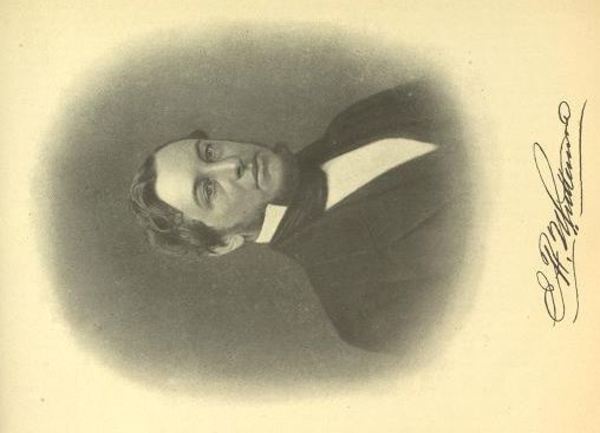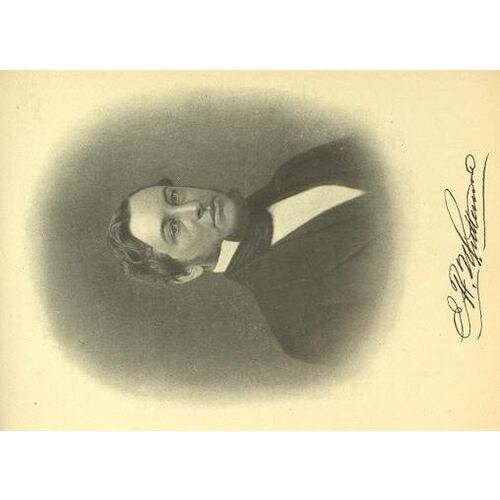
Source: Link
WHITTEMORE, EZEKIEL FRANCIS, businessman and politician; b. 2 July 1818 in Montreal, son of Thomas Whittemore, nail-maker, and Priscilla Belding, both from New England; m. 6 April 1843 Margaret Johnston, and they had six children (one of whom died in infancy); d. 19 Feb. 1859 in Toronto.
Ezekiel Francis Whittemore began his commercial career in Montreal in the 1830s but his first modest ventures ended in bankruptcy by 1840. Making a new start, he moved to Toronto to work as a clerk for the mercantile firm of Thomas Rigney and Company. By 1844 he had accepted a partnership and in 1848, following Rigney’s move to New York as the firm’s partner there, Whittemore and another partner, Edward Henderson Rutherford, reorganized the business in Toronto to form Whittemore, Rutherford and Company. A general wholesale and agency business dealing largely with New York, it sold dry goods, hardware, groceries, and “American” merchandise, dealt in produce and real estate, and represented several Hartford, Conn., insurance companies.
The business prospered greatly in the commercial boom of the 1850s in Toronto and Whittemore was said to have achieved financial independence. Apparently as a result the partnership with Rigney and Rutherford was dissolved in 1854. On 1 July 1855 Whittemore formed E. F. Whittemore and Company in partnership with two young but enterprising employees, Elswood Chaffey and Edmund Morris. The firm, which continued Whittemore’s interests in the grain trade and insurance business, also entered private banking. It bought and sold banknotes and bills of exchange, and acted as agent for banks from Montreal, New York, Chicago, and other cities. This finance-oriented development, found also in the Toronto mercantile firm of Robert Henry Brett, indicated growing sophistication and specialization in the Toronto market, but Whittemore’s initiative proved premature. Severe financial difficulties in the panic of 1857 forced him to sell land and other assets, and his firm failed. Whittemore nevertheless continued the banking and insurance business on a reduced scale with Chaffey and by 1859 had apparently begun to regain financial stability.
Widely respected for his integrity and business acumen, Whittemore was a leading participant in several of the financial and commercial institutions which had emerged in Toronto. A founding member in 1844 of the Toronto Board of Trade, he served as a member of its council, acted as vice-president (1856–58), and was elected its third president just a month before his death. On the board he consistently spoke for business strategies designed to solidify Toronto’s commercial position and specifically to foster its role in the western grain trade and in the creation of transportation links to the northwest. In 1846 Whittemore participated in organizing Toronto’s first telegraph company. He was a founder of the Toronto Building Society that year, a director by 1850, and vice-president of its successor, the Toronto Permanent Building Society. The society’s directors were by 1850 among the city’s most competent mercantile managers and included the merchants Thomas Dennie Harris* and Peter Paterson*. In 1855 the society became the Canada Permanent Building and Savings Society, of which Whittemore was a founding director. He was also a founder, treasurer, and director of the Toronto Exchange (organized in 1854–55 as a focus for the grain trade), a founder (1847) and president (1856–59) of the Consumers’ Gas Company of Toronto, and a director and vice-president (1858–59) of the Provincial Mutual and General Insurance Company.
A keen proponent of Toronto’s railway ambitions, Whittemore supported the Ontario, Simcoe, and Huron Rail-road Union Company in 1850 and a year later the Toronto and Guelph, of which, through his roles in business and civic politics, he became a founding director. As agent in the purchase of shares, he played a profitable part in this railway’s take-over in 1853 by Gzowski and Company [see Sir Casimir Stanislaus Gzowski*] on behalf of the Grand Trunk Railway. Whittemore served as a director of the Grand Trunk until about 1857. He provided an important liaison with Toronto’s business community but, as few Torontonians had even a nominal role in that company, it is unlikely that he was a powerful figure on its board.
Whittemore took an active interest in politics and public affairs. His defence of free trade, opposition to the clergy reserves, and support of Malcolm Cameron*, the outspoken reform politician, revealed Whittemore’s strong reform orientation. At the municipal level he was elected a councilman in 1848 for St George’s Ward, one of the few reformers to win election to the city’s tightly tory council. With three others, however, he resigned in April 1849 to protest the council’s refusal to condemn a Toronto riot sparked by the Rebellion Losses Bill controversy [see James Bruce*]. He resumed civic activity as a school-board trustee in 1850–51 and was re-elected to council in 1851 as an alderman for St James’s Ward. Whittemore’s defeat the following year ended his electoral career. He nevertheless took a continuing interest in the Toronto Mechanics’ Institute and served as its vice-president (1854–55) and president (1856–57). A Congregationalist, he worked with strong conviction in a number of temperance, mission, and sabbath observance organizations.
Ezekiel Francis Whittemore was one of the outstanding figures in Toronto’s dynamic business community of the 1840s and the 1850s. His comprehensive career, despite its brevity, reflects exceptionally well the city’s business and political history in his time.
[A portrait and autograph of Whittemore are found in Commemorative biographical record of the county of York, Ontario . . . (Toronto, 1907), but the article on him contains a number of inaccuracies. d.mcc.]
AO, RG 22, ser.302, administration of E. F. Whittemore estate. BLHU, R. G. Dun & Co. credit ledger, Canada, 26: 28, 128. CTA, RG 1, A, 1848–51. Metropolitan Toronto Board of Trade, Resource Centre (Toronto), Toronto Board of Trade, council minute book, 30 April 1850–24 Jan. 1871. PAC, RG 30, 485, 1000, 1597. PCA, St Gabriel Street Church (Montreal), reg. of baptisms, marriages, and burials, 30 Dec. 1818. Toronto Exchange, Report, charter, and by-laws, of the Toronto Exchange . . . (Toronto, 1855). Globe, 1849–59. Leader, 23 Feb. 1859. Toronto directory, 1843–56. B. D. Dyster, “Toronto, 1840–1860: making it in a British Protestant town” (1v. in 2, phd thesis, Univ. of Toronto, 1970), 246–332. Robertson’s landmarks of Toronto, 1: 81–82, 330; 2: 616; 3: 138, 143, 176, 206, 208–9, 246–47; 6: 53. Samuel Thompson, Reminiscences of a Canadian pioneer for the last fifty years: an autobiography (Toronto, 1884; repub. Toronto and Montreal, 1968), 192. J. F. Whiteside, “The Toronto Stock Exchange to 1900: its membership and the development of the share market” (ma thesis, Trent Univ., Peterborough, Ont., 1979). Douglas McCalla, “The commercial politics of the Toronto Board of Trade, 1850–1860,” CHR, 50 (1969): 51–67.
Cite This Article
Douglas McCalla, “WHITTEMORE, EZEKIEL FRANCIS,” in Dictionary of Canadian Biography, vol. 8, University of Toronto/Université Laval, 2003–, accessed March 1, 2026, https://www.biographi.ca/en/bio/whittemore_ezekiel_francis_8E.html.
The citation above shows the format for footnotes and endnotes according to the Chicago manual of style (16th edition). Information to be used in other citation formats:
| Permalink: | https://www.biographi.ca/en/bio/whittemore_ezekiel_francis_8E.html |
| Author of Article: | Douglas McCalla |
| Title of Article: | WHITTEMORE, EZEKIEL FRANCIS |
| Publication Name: | Dictionary of Canadian Biography, vol. 8 |
| Publisher: | University of Toronto/Université Laval |
| Year of publication: | 1985 |
| Year of revision: | 1985 |
| Access Date: | March 1, 2026 |



